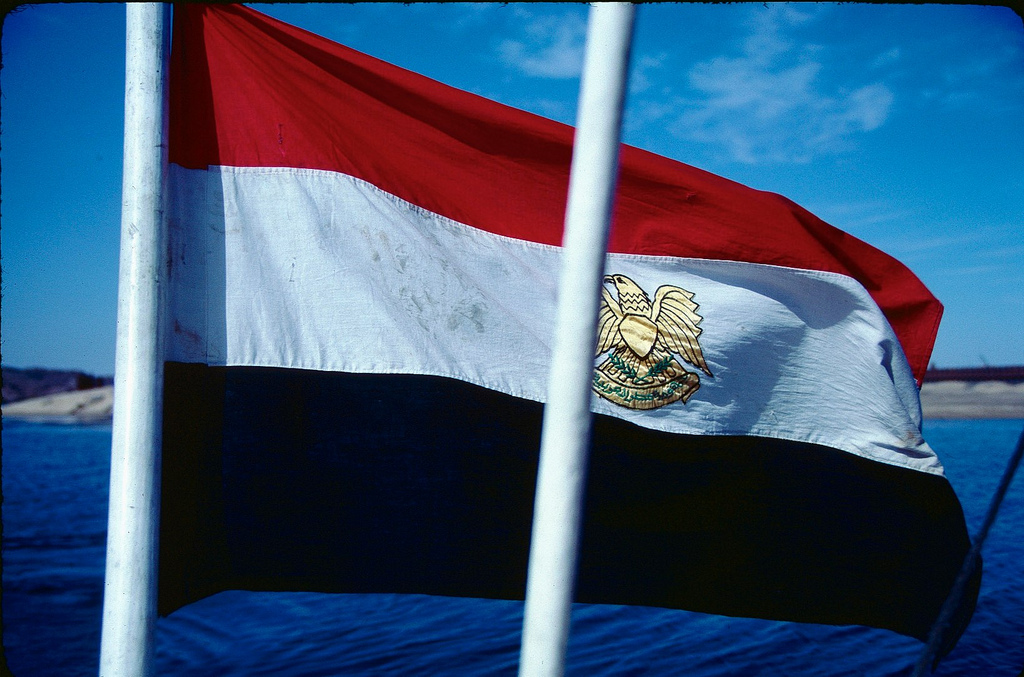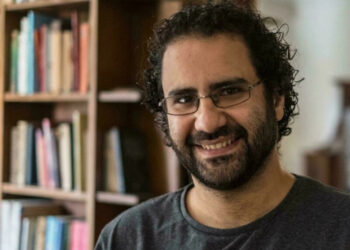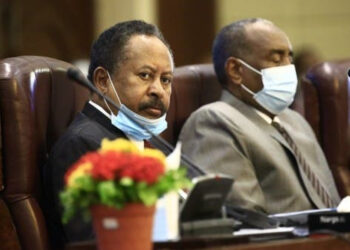The National Football League, the main professional league for American Football, has a clear strategy to develop the game internationally. That strategy, at least outside North America, has been to target the wealthy democracies, like the United Kingdom, where the NFL will hold four games this year.
Egypt doesn’t fit that profile, which is why the rise of American football there is so unexpected. Egypt is the only country in the Middle East and Africa which boasts a domestic league: the Egyptian Federation of American Football (EFAF).
The start-up league, which began operations in 2013, has attracted hundreds of players over the year, and many of them have become football diehards. Dia Hamm is one of those.
Every time Hamm puts on his pink gloves, he knows why he was put here on this earth. Dia Hamm, who has played for teams with such dramatic names as Cairo Hellhounds, which describes itself as “most feared team in Egypt,” is one of several that have been formed in the past years. Most of the teams are located around the Cairo metropolitan area.
“Since I was a little boy, I loved American football movies. So once I got the chance, I was out there on the field running the ball,” Hamm says. Hamm is one of hundreds of young Egyptians who have flocked to the game.
“What they lack in facilities they make up in passion for the game,” said Todd Buelow, an officer of American Football Without Borders. “We were surprised how much they had learned about football just from videos on Youtube.”
Indeed, Egyptian passion for American football is what convinced American Football Without Borders to visit Egypt in the first place. The group, which usually makes one international trip a year, was also considering South Africa or Australia but ultimately focused on Egypt. It looks for players who might be eligible for recruitment to a professional or collegiate team in the United States. One of the players scouted in the tour later earned an invitation to two college football camps in America.
“We had players in our Egypt camps who both supported and were against the coup in 2013 but, what is amazing about football is its ability to bring people,” Buelow said.
The origins of organized football in Egypt began in 2007.
“The sport was introduced in Egypt by an Egyptian-American who played football in high school and wanted to bring the sport to Egypt,” says Hamm. The sport became organized in 2011 when two teams were formed. In 2013, the Egyptian League of American Football (ELAF) was formed. The league was recognized by the IFAF, American football’s answer to FIFA a year later in 2014.
Egypt isn’t the only country outside America to take an interest in American football in recent years with competitive leagues sprouting from China to Turkey.
However, unlike domestic leagues outside the United States, the league in Egypt has always maintained close links to universities which are used to host its matches and also as a source of player recruitment.
That changed in March 2016, when Omar Khaled of the American University of Cairo died after being injured in his first game. The freshman student and would be football lineman reported chest pain and was transferred to a medical center on campus during the game.
From there accounts differ as to what happened next but, according to a statement from the university following his death, he died on his way to a local hospital. The incident lead to a suspension in play, and a thorough review of safety procedures before competitive play was allowed to resume.
“I was looking forward to playing football in university but, the death last year made me reconsider,” said Ahmed, as he stares out to sea from a plastic chair of a working-class apartment tower on the seafront in Alexandria. The young 18-year-old has the solid muscular frame of a football player and once dreamed of playing linebacker for an Egyptian team. His relatives in the United States had played the game at the high school level. Now he is unsure if he will play football or focus on weight-lifting.
“Having camps like ours and promoting football in Egypt isn’t about just promoting football, it’s about promoting fitness and a healthy lifestyle. In America, you have to get a physical from a doctor before you can play, and they probably need something like this in Egypt,” said Gary Barnidge, a professional player with the NFL’s Cleveland Browns, who visited Egypt with American Football Without Barriers.
The sport has proved popular in Egypt, and according to EFAF, there are some 600 registered players in the country.
“I was really struck by the passion of the players in Egypt for this game and how they showed up for our camps hungry to learn,” said Barnidge.
Egypt is home to eight men’s and eight women’s teams with colorful names like the Eagles and the Hellhounds. “The Hellhounds is not a religiously offensive name, it’s just a fictional name taken from a video game,” said Ali Rafeek, who is the former director of the EFAF and now directs the team.
Last year, U.S. Ambassador to Egypt R. Stephen Beecroft attended an Egyptian National Football League game in Cairo. Egyptian government officials have also attended matches in the past. Some Egypt television channels have provided limited coverage of the annual Egypt Bowl.
EFAF says the number of players getting interested in the game is increasing in particular with women. In May of last year, Egypt defeated Morocco 37-18 in the first international women’s match of the sport held in Africa, an important victory in what is emerging to be one of IFAF’s most important rivalries.
In December 2014, Egypt was defeated 26-6 in the first-ever IFAF championship in Africa. Despite the win, Morocco did not organize a team to participate in the world championships that year.
American football teams and clubs have also popped up in Qatar, Saudi Arabia, Jordan and Kuwait, and the United Arab Emirates have also started clubs. Back in Egypt, Rafeek is optimistic.
“We had the first women’s game in May 2016 and continue to develop an all-women flag football league the first of its kind in the Middle East. The future of American football in Egypt is strong,” Rafeek explains.
The next major hurdle for Egyptian football will be to qualify for the IFAF American Football World Cup, which is expected to be held in 2019.























